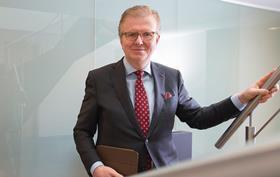
Fresh produce growers in the UK have to adapt their operations to grow a wider range of produce if they are to be successful post-Brexit.
That was the view of Hein Deprez, executive chairman of European fruit and vegetable giant Greenyard Foods, who was speaking at a session entitled 'Global commercial opportunities for Brexit and beyond' at this week's London Produce Show.
In a forthright speech, Deprez said that he was certain the UK agricultural industry could come out of Brexit in a positive fashion, as long as farmers were willing to be 'disruptive' and 'adaptable'.
'To succeed, you must adapt to conditions and consumer demands, offering a full assortment of products that are drawn from all over the world,' he told delegates.
'In the UK, there must be a change in mentality. Excuse me for saying it like this, but we have to work harder in the UK, we are not productive enough,' Deprez continued. 'One-third of the fruit and vegetables on sale in the UK are locally produced, with one-third from Europe and one-third from overseas. The UK should be working to push the locally produced total up to 50 per cent over the next five years.'
He explained that he was not expecting products such as bananas or oranges to suddenly be produced in the UK, but suggested there was room for a lot of other important fruits and vegetables to be grown in the country.
'I have worked with farmers here for years and they say it is too difficult and too much work to grow certain fruits and vegetables – but then it is not the English people who are actually working on the farms, it is the Portuguese or the Polish working for low salaries,' Deprez added. 'The UK has to farm better, be more intensive and more productive. The opportunity is there and it is possible.'
He also dismissed the notion that European subsidies are required to make a success of the business.
'I am the living example of working in Europe and succeeding without subsidies,' Deprez noted. 'You don't need them, what you need is the right concept and the right way of working.
'The world is always changing,' he concluded, 'and people often say things are impossible, but you must make them possible. People will continue to demand and consume, so you must adapt to suit these needs, and you must grasp the opportunity to produce a lot of fruits and vegetables here in the UK.'



